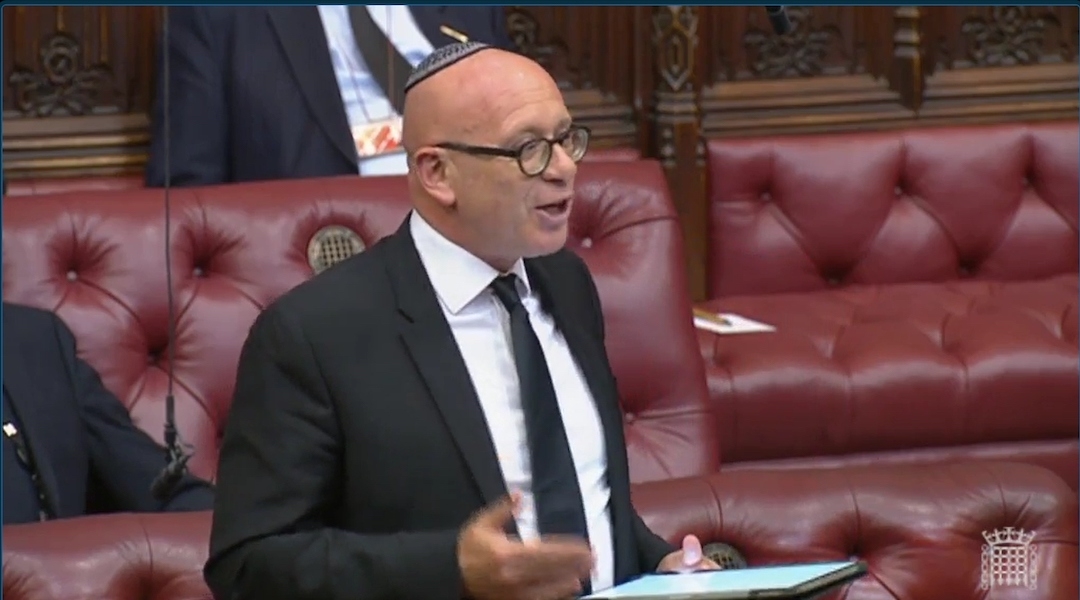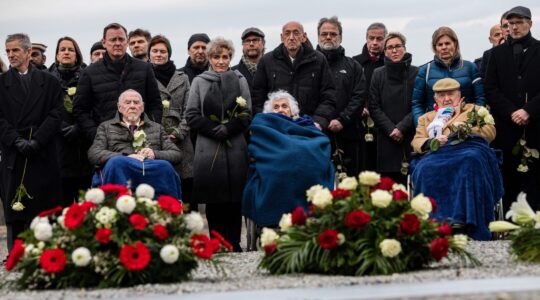(JTA) — Queen Elizabeth has been eulogized by countless politicians and other leading figures across the globe. But in his tribute to the late monarch in the House of Lords, Baron David Wolfson used a new method of talking about the significance of her death: explaining a pillar of Jewish mysticism.
In a six-minute speech on Friday, Wolfson, a Conservative who served as a justice minister under Boris Johnson, walked his peers through several aspects of Jewish tradition — including gematria, the Jewish practice of finding meaning through the numerical value of words.
First he discussed the term “mitzvah,” or good deed, explaining that it is not simply a good deed one does at will — it is a duty whose roots are the Hebrew letters tzaddi and vav, or “tzav.”
“Her late majesty spent her whole life doing the right thing, and not just because she felt like it, or because the mood took her,” he said “She spent her 96 years doing the right thing day in and day out, out of a sense of duty.”
Wolfson then slid into the magical realm of gematria, which was developed by Kabbalah practitioners, noting that the sum of the Hebrew letters that make up the word mitzvah add up to 96.
“In one of those coincidences, which perhaps are not, the value, the numerical value of the Hebrew word tzav, the root of the word mitzvah is 96 — 96 years of tzav, of duty, and also of mitzvah of doing the right thing, because that is your duty,” Wolfson said.
Wolfson also noted that in synagogues throughout the world, the reading of the Torah will soon be complete, and that tradition dictates that it start again right away. That offers a parallel to the British tradition of mourning the passing of one monarch and joyously welcoming another, in this case, King Charles III.
“We’ve closed one book, a long and good book which we’ve had with us for so many years, and we are about to open another,” said Wolfson, a lawyer who studied in his youth at a yeshiva in Jerusalem. “And as we all pray that God save our King, I will also pray that he too may enjoy a reign of mitzvah of doing the right thing, for that now is his duty.”
Wolfson and at least two other lawmakers, Baron Stuart Polak and Robert Halfon, a Conservative member of parliament from Harlow, in Essex, each spoke of the poignancy facing them and hundreds of thousands of Briths Jews as the Sabbath loomed. For the first time in their lives — for the first time in the 70 years since Elizabeth assumed the throne — they would pray for the welfare of a king, not a queen.
“And so tomorrow for the first time in my life, we will not pray in synagogue for Prince Charles, but for King Charles,” said Wolfson, who also noted a change to his status as an attorney who is authorized to practice in certain high courts. “I started yesterday as a Queen’s counsel, and I finished it as a King’s counsel.”
Polak, speaking the same day in the House of Lords, recalled in his remarks a conversation he had in 2016 with Princess Anne, Queen Elizabeth’s daughter, in which they regretted that the British Foreign Office forbade her from traveling to Israel and the West Bank because of the sensitivities attached to the area among Britain’s Arab and Muslim allies.
“We agreed as someone who was deeply religious and God-fearing, it was sad, it is sad that she never walked down the Via Dolorosa into the Church of the Holy Sepulchre,” he said. “She never walked and visited the Church of the Nativity in Bethlehem or experienced the peace and tranquility on the shores of the Sea of Galilee.”
Halfon noted how Elizabeth’s reign coincided with the assimilation of Britons of all backgrounds into the middle class, noting that his town Harlow was one to where residents of London’s East End — including many of its Jews — migrated in the post-World War II era.
He described the queen swearing him in 2015 as a member of the Privy Council, the body of officials reporting to the monarch.
“Her Majesty did not bat an eyelid,” he said. “I thought, ‘There am I, a son of an immigrant to this country, becoming a member of the Privy Council’, and I thought to myself, ‘what an honor and what a meritocratic country we have.’”
JTA has documented Jewish history in real-time for over a century. Keep our journalism strong by joining us in supporting independent, award-winning reporting.






